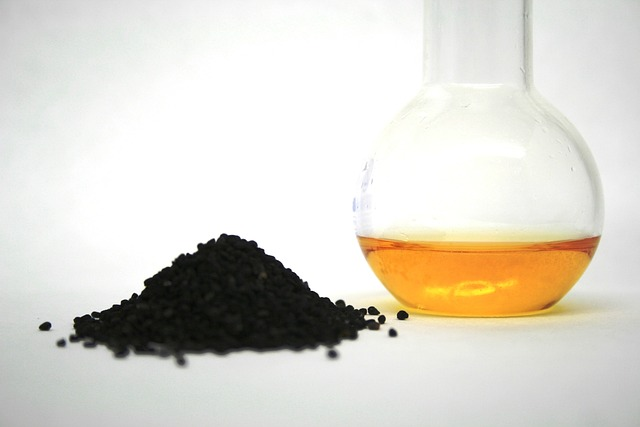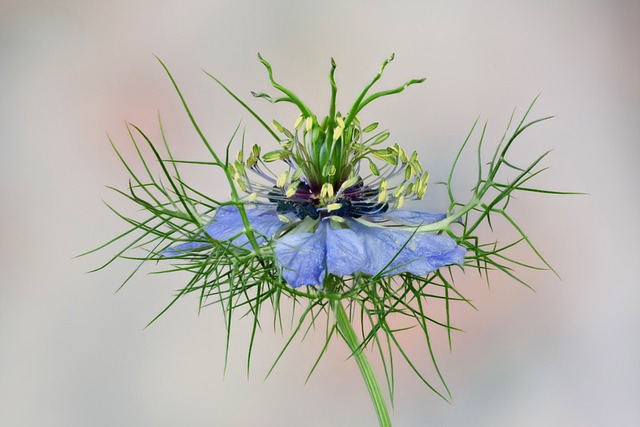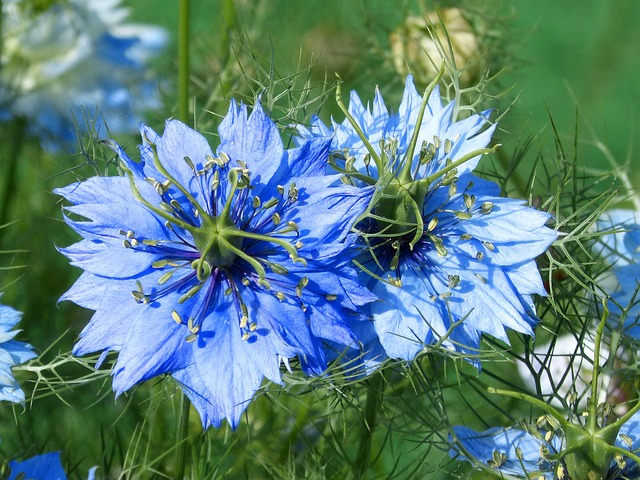
For thousands of years, black seed oil, as called black cumin oil, has been used in the Middle East to treat a myriad of conditions. This ancient remedy is said to have an array of benefits—but does it live up to its reputation? Today, we’re exploring the evidence behind how this mysterious elixir might prevent and/or relieve symptoms for various issues by delving into what makes black seed oil so special: its active ingredient thymoquinone. Keep reading as we uncover whether or not this reputed panacea actually holds therapeutic properties – or if it’s just another herb with overstated claims.
Black seed oil comes from the Nigella Sativa plant

Nigella sativa is a flowering plant native to Southwest Asia and also cultivated in other parts of the world. Its seeds – known as black cumin, kalonji, fennel flower, nutmeg flower and black sesame – are the source of black seed oil. The Nigella sativa plant is also an ornamental plant, much loved for its beautiful blue and white flowers.
Black cumin seeds have been used for thousands of years

Black seed oil can be traced back to traditional medicine for over 3,000 years. The use of black seed oil originated in ancient Middle Eastern cultures, with even the Prophet Muhammad famously quoting the importance of it as a remedy. Later, it spread across the Mediterranean where it became an important traditional remedy for a great range of ailments from toothache to digestive problems. To this day, black seed oils remains popular for medicinal purposes with an ever growing list of possible applications. It has received global interest in modern times as more and more scientists are looking at traditional medicines and their potential health benefits.
Thymoquinone seems to be the key component to black seed oil's benefits

Thymoquinone is a compound found in black seed oil and is believed to be the main active ingredient responsible for its therapeutic benefits. It has been investigated for a range of applications from anti-inflammatory, anti-cancer, anti-diabetic to antioxidant properties.
In terms of inflammation, thymoquinone has been shown to inhibit inflammatory pathways by reducing the production of pro-inflammatory cytokines, proteins and enzymes which are involved in the body’s inflammatory response. It has been studied for its potential anti-cancer applications due to its ability to induce apoptosis (cell death) in cancer cells while leaving healthy cells unharmed. It also shows promise in reducing blood sugar levels by improving insulin sensitivity and reducing fasting glucose levels.
Black seeds and black seed oil has uses in cooking and as an herbal remedy
Black seed oil has a flavor reminiscent of oregano and is frequently used as an ingredient in food and flavorings. Its popularity is partially due to its flavor, but it also has a long history of being used as herbal medicine. It has been in use for over 3,000 years and was originally used mainly in the Middle East as a remedy.
Today, black seed oil is used to treat a wide range of ailments including skin disorders, constipation, respiratory ailments, high blood pressure, and to boost the immune system. While many are still unaware of its potential healing properties, its inclusion in food recipes has allowed more people around the world to experience its flavor and reap its benefits.
Black seed oil may help with blood pressure, blood sugar, certain skin conditions, and more
The health benefits of black seed oil are becoming more and more recognized in the health and wellness world. Numerous studies have shown that regularly consuming black seed oil may reduce high blood pressure, lower blood sugar levels, and help with weight, hair loss, and male fertility. For example, a recent large-scale study on human participants showed improvements in those who were administered a daily dose of black seed oil for two months. This is significant news for health enthusiasts looking to make the most out of natural remedies and treatments.
Topical black seed oil as been studied for its benefits in treating skin conditions such as psoriasis, eczema and acne
While it is still unclear how black seed oil works exactly to treat skin conditions, some research suggests that it may be due to the anti-inflammatory properties of its active ingredient, thymoquinone. Additionally, studies have shown that topical application of black seed oil may help reduce the appearance of wrinkles and fine lines in aging skin, which is great news for those who want to maintain a youthful complexion.
There are some safety considerations when taking black seed oil

Using black seed oil can have a range of beneficial effects, however medical caution should be applied. It is known that black seed oil affects blood clotting, and so avoid taking it before surgery or if you have any concerns about your blood clotting genes. For those with underlying conditions, it is best to avoid using black seed oil until more research has been conducted into the effects it may have. Ultimately, if in doubt, consult with a doctor before considering whether or not to use black seed oil for therapeutic purposes.
Black seed oil can be consumed directly, added to food, or applied topically
Incorporating black seed oil into your daily routine can provide numerous benefits for both your physical and mental well-being. Consuming it directly, adding the oil to food, or mixing it with other ingredients such as honey or cinnamon can all be effective ways to use the natural remedy. Research has shown that if you take two teaspoons of black seed oil per day, you may experience a range of positive effects on your health.
A study published in 2018 also suggested that people should consider making the oil part of their regular dietary intake due to its anti-inflammatory, anti-fungal, anti-bacterial, immunomodulatory and other properties. So why not make it part of your daily routine and reap the many potential rewards?
The benefits of black seed oil extended to whole black seeds and black seed powder
The benefits of black seed oil extended to whole black seeds and black seed powder. As with the oil, studies have shown that regularly consuming black seed powder can contribute to a healthier lifestyle. It may be consumed in capsule form or added to smoothies and drinks for those looking to reap the potential benefits of this ancient remedy. Ultimately, it’s important to remember that more research is needed into the effects of black seed oil before making any health decisions and to always consult with a doctor if you have any concerns. However, the potential benefits of this ancient remedy make it worth considering as part of your regular routine.

Black seed oil is an ancient remedy with modern applications. Throughout history, it has been used for culinary, cosmetic, and medicinal purposes. Today, research continues to explore potential benefits related to its active components, including antioxidants. While there is still no concrete scientific proof as to whether black seed oil offers health benefits, many anecdotal accounts strongly suggest that it can provide relief from a variety of conditions. If you are interested in trying black seed oil a simple and safe way to incorporate it into your daily routine is to add it to your food or drinks instead of taking it directly. Ultimately, though, the decision should be made after carefully considering potential side effects and safety considerations. Are you convinced of black seed oil's benefits? Let us know in the comments.
Comments
Post a Comment